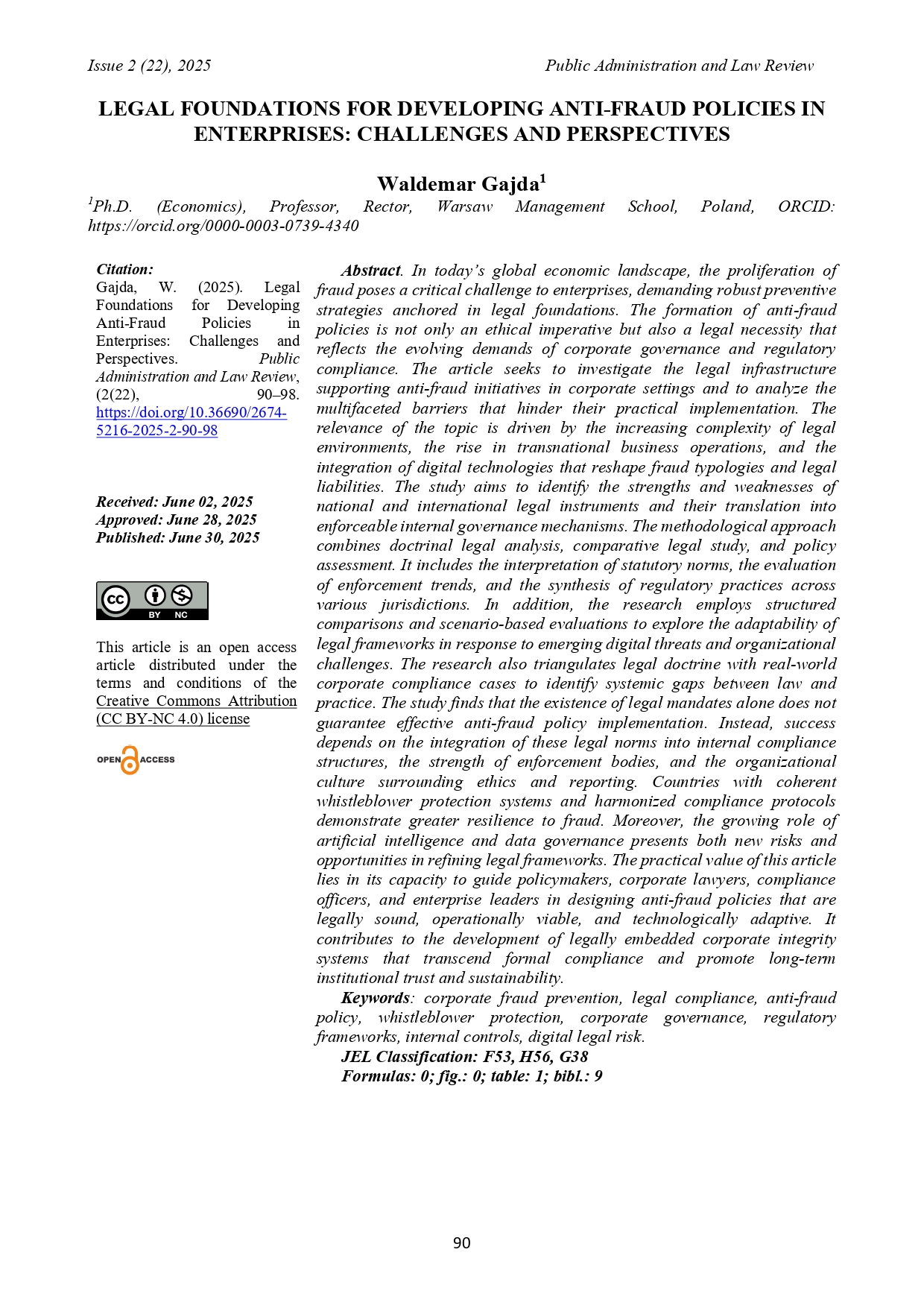LEGAL FOUNDATIONS FOR DEVELOPING ANTI-FRAUD POLICIES IN ENTERPRISES: CHALLENGES AND PERSPECTIVES
DOI:
https://doi.org/10.36690/2674-5216-2025-2-90-98Keywords:
corporate fraud prevention, legal compliance, anti-fraud policy, whistleblower protection, corporate governance, regulatory frameworks, , internal controls, digital legal riskAbstract
In today’s global economic landscape, the proliferation of fraud poses a critical challenge to enterprises, demanding robust preventive strategies anchored in legal foundations. The formation of anti-fraud policies is not only an ethical imperative but also a legal necessity that reflects the evolving demands of corporate governance and regulatory compliance. The article seeks to investigate the legal infrastructure supporting anti-fraud initiatives in corporate settings and to analyze the multifaceted barriers that hinder their practical implementation. The relevance of the topic is driven by the increasing complexity of legal environments, the rise in transnational business operations, and the integration of digital technologies that reshape fraud typologies and legal liabilities. The study aims to identify the strengths and weaknesses of national and international legal instruments and their translation into enforceable internal governance mechanisms. The methodological approach combines doctrinal legal analysis, comparative legal study, and policy assessment. It includes the interpretation of statutory norms, the evaluation of enforcement trends, and the synthesis of regulatory practices across various jurisdictions. In addition, the research employs structured comparisons and scenario-based evaluations to explore the adaptability of legal frameworks in response to emerging digital threats and organizational challenges. The research also triangulates legal doctrine with real-world corporate compliance cases to identify systemic gaps between law and practice. The study finds that the existence of legal mandates alone does not guarantee effective anti-fraud policy implementation. Instead, success depends on the integration of these legal norms into internal compliance structures, the strength of enforcement bodies, and the organizational culture surrounding ethics and reporting. Countries with coherent whistleblower protection systems and harmonized compliance protocols demonstrate greater resilience to fraud. Moreover, the growing role of artificial intelligence and data governance presents both new risks and opportunities in refining legal frameworks. The practical value of this article lies in its capacity to guide policymakers, corporate lawyers, compliance officers, and enterprise leaders in designing anti-fraud policies that are legally sound, operationally viable, and technologically adaptive. It contributes to the development of legally embedded corporate integrity systems that transcend formal compliance and promote long-term institutional trust and sustainability.
Downloads
References
Aguilera, R. V., & Cuervo-Cazurra, A. (2009). Codes of Good Governance. Corporate Governance: An International Review, 17(3), 376–387.
Albrecht, W. S., Albrecht, C. O., Albrecht, C. C., & Zimbelman, M. F. (2012). Fraud Examination (4th ed.). Cengage Learning.
Arjoon, S. (2006). Striking a Balance between Rules and Principles-based Approaches for Effective Governance: A Risk-based Approach. Journal of Business Ethics, 68(1), 53–82.
Callahan, E. S., & Dworkin, T. M. (2000). The State of State Whistleblower Protection. American Business Law Journal, 38(1), 99–142.
Hoekstra, A. (2023). Compliance in the Age of Data Regulation: Fraud Detection under GDPR. European Law Review, 48(2), 112–130.
ISO. (2016). ISO 37001: Anti-Bribery Management Systems — Requirements with Guidance for Use. International Organization for Standardization.
Koehler, M. (2022). The FCPA in a Global Marketplace. International Journal of Law and Management, 64(1), 20–40.
McCormack, W. (2019). Corporate Governance and the Law: Regulation, Risk and Compliance. Modern Law Review, 82(4), 657–682.
Nichols, P. M. (2012). The Business Case for Complying with Bribery Laws. American Business Law Journal, 49(2), 325–368.
OECD. (2021). OECD Anti-Bribery Convention: Implementation Report.
Pieth, M., & Ivory, R. (2011). Corporate Criminal Liability: Emergence, Convergence, and Risk. Springer.
Rose-Ackerman, S. (2008). Corruption and Government: Causes, Consequences, and Reform. Cambridge University Press.
UNODC. (2021). United Nations Convention against Corruption. United Nations Office on Drugs and Crime.
UK Ministry of Justice. (2011). Guidance about Procedures Which Relevant Commercial Organisations Can Put into Place to Prevent Persons Associated with Them from Bribing (UK Bribery Act Guidance).
Warren, S. D., & Brandeis, L. D. (2020). The Legal Implications of AI in Corporate Compliance. Harvard Law & Tech Review, 4(1), 5–26.

Downloads
Published
How to Cite
Issue
Section
License

This work is licensed under a Creative Commons Attribution-NoDerivatives 4.0 International License.





